History
Odumegwu Ojukwu College of Health Sciences and Technology is emergent with a strategic positioning to sustainably transform the scope and quality of healthcare delivery.
12+
Years of history and education
Health Education and Promotion is an effective tool for galvanizing individual and collective health endeavors aimed at preventing diseases, improving the health and wellbeing of the populace as well as ensuring a healthier society for all.
The world is experiencing drastic changes in disease patterns largely due to globalization and consumption patterns resulting in rising population affected by cancers, diabetes, and hypertension. Also on the rise are mental health disorders, traffic and industrial accidents, violence, unsafe sex and insufficient health-sustaining physical activity. Other threats include insecurity, floods, Lassa fever, Ebola, Cholera, Polio, Avian Influenza and COVID-19.
Nigeria’s healthcare system faces several challenges that disallow effective delivery of affordable quality healthcare to the citizenry. The country still has one of the highest child and maternal mortality rates in the world; ranking 10th after Chad, Somalia, Central Africa, Sierra Leone, Burundi, Guinea-Bissau, Liberia, Sudan and Cameroon.
The high child and maternal mortality rates are mostly due to infrastructural deficits, inadequate access to quality medical care in the rural and remote areas of the country and to shortage of well trained physicians and midwives.
At 0.389 physicians per 1,000 people, Nigeria is far from meeting the low benchmark of the 2.5 physicians, nurses and midwives per 1,000 people set by the World Health Organization. Other allied health professionals are also in very short supply in Nigeria. For example, the physiotherapists per population ratio (density) stands at 63,349 and it is one of the highest (that is, worst) in the world. Nigeria has 1. 7 physiotherapists per 100,000 people, compared to 12 physiotherapists for Tunisia, 13 for South Africa, 49 .4 for Canada, 61 .4 for Australia, and 64. 7 for the U.S.A. The National Health Policy (NHP) recognizes that Nigeria is saddled with an unbearable burden of Communicable and Non-Communicable Diseases (NCDs). This is coupled with issues such as low levels of health literacy, poor sanitation and inadequate attention to key social determinants of health. There is the critical need for professional and in-service training, education and promotion in health primarily with reckoning to a culturally relevant setting to enhance application of new knowledge and skills. The establishment of Odumegwu Ojukwu College of Health Sciences and Technology is therefore viewed as of paramount importance. Health promotion draws from the biological, environmental, psychological, physical and medical sciences to promote health and prevent diseases, disability and premature death through education-driven behavior change activities. It culminates in the development of individual, group, institutional, community and systemic strategies to improve health knowledge, attitudes, skills and behavior. The purpose of health promotion is to positively influence the health behavior of individuals and communities as well as the living and working conditions that influence their health which can only be achieved by well trained personnels. Nigeria is experiencing a demographic transition bringing about an increased demand on a fragile health system. In response to the need for a vibrant, robust and sustainable health system, Health Promotion in the country is evolving from primarily Heath Educationfocused to be more holistic and inclusive in health management and in the prevention of diseases. Deliberate efforts are required to integrate health interventions and promotion within a multi-sectoral context, addressing the broader determinants of health, promoting healthy lifestyles, and galvanizing health actions by individuals, families, communities and entire populations.
At 0.389 physicians per 1,000 people, Nigeria is far from meeting the low benchmark of the 2.5 physicians, nurses and midwives per 1,000 people set by the World Health Organization. Other allied health professionals are also in very short supply in Nigeria. For example, the physiotherapists per population ratio (density) stands at 63,349 and it is one of the highest (that is, worst) in the world. Nigeria has 1. 7 physiotherapists per 100,000 people, compared to 12 physiotherapists for Tunisia, 13 for South Africa, 49 .4 for Canada, 61 .4 for Australia, and 64. 7 for the U.S.A. The National Health Policy (NHP) recognizes that Nigeria is saddled with an unbearable burden of Communicable and Non-Communicable Diseases (NCDs). This is coupled with issues such as low levels of health literacy, poor sanitation and inadequate attention to key social determinants of health. There is the critical need for professional and in-service training, education and promotion in health primarily with reckoning to a culturally relevant setting to enhance application of new knowledge and skills. The establishment of Odumegwu Ojukwu College of Health Sciences and Technology is therefore viewed as of paramount importance. Health promotion draws from the biological, environmental, psychological, physical and medical sciences to promote health and prevent diseases, disability and premature death through education-driven behavior change activities. It culminates in the development of individual, group, institutional, community and systemic strategies to improve health knowledge, attitudes, skills and behavior. The purpose of health promotion is to positively influence the health behavior of individuals and communities as well as the living and working conditions that influence their health which can only be achieved by well trained personnels. Nigeria is experiencing a demographic transition bringing about an increased demand on a fragile health system. In response to the need for a vibrant, robust and sustainable health system, Health Promotion in the country is evolving from primarily Heath Educationfocused to be more holistic and inclusive in health management and in the prevention of diseases. Deliberate efforts are required to integrate health interventions and promotion within a multi-sectoral context, addressing the broader determinants of health, promoting healthy lifestyles, and galvanizing health actions by individuals, families, communities and entire populations.
The College

2012
Opening of the university library


2015
Our nursing students


2017
Hundreds of students successfully graduate first degree programs


2020
College library court yard.


2021
College front court yard.

Previous
Next
